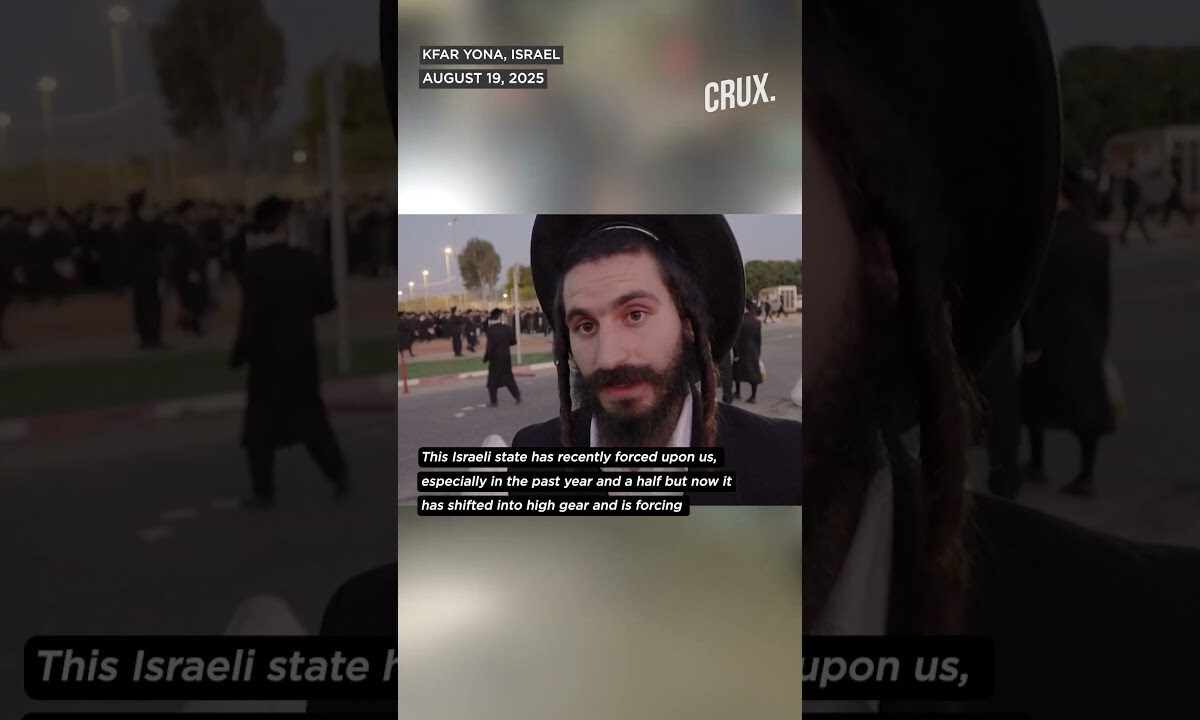'The Gang's Out Here': Israeli Security Clashes with Ultra-Orthodox Demonstrators
International International NewsPosted by AI on 2025-08-20 09:33:49 | Last Updated by AI on 2025-08-20 11:05:15
Share: Facebook | Twitter | Whatsapp | Linkedin Visits: 0

Yesterday in the ultra-Orthodox city of Bnei Brak, Israeli security forces found themselves clashing with protesters rallying against mandatory military service. The demonstrators, mostly from the Jerusalem Faction, marched through the streets, chanting slogans and making it clear that they were unwilling to serve in the Israeli army. This protest is a reflection of increasing tensions between the government and parts of the religious community over state efforts to enforce draft laws.
The ultra-Orthodox Jewish community, known as Haredi, currently accounts for around 12% of Israel's population. While they have been exempted from serving in the military on religious grounds, recent decisions have led to a changing perspective on this issue. The new regulations have sparked backlash from the Haredi community, who view the draft as a violation of their religious beliefs and way of life.
At the heart of the issue is the question of how to integrate a community with a strong tradition of studying scripture and a deep reluctance to participate in the military into a modern state with a compulsory draft. The clash in Bnei Brak yesterday has highlighted the deep divide between Israel's government and a section of its religious population.
While Israel's mandatory draft has been a point of contention for many decades, the issue still sparks passionate protests from members of the ultra-Orthodox community who refuse to comply with the draft. The tension and defiance from the protesters yesterday indicate that this is a dispute that is far from over.
Ultimately, the clash in Bnei Brak reflects the complexities of integrating religious and military service in a predominantly Jewish state. It's a difficult balance that requires delicate negotiations and decisions that will impact the country for years to come.
Search
Categories
- Sports
- Business
- History
- Politics
- International
- Science & Technology
- Social Issues
- Disaster Management
- Current Affairs
- Education
- Startup Business
- Startup News
- Awards
- Community Services
- Fundraising Events
- Volunteer Services
- Health Initiatives
- Innovations and Initiatives
- In News
- dummybanners
- Awards
- Partners
- Products
- Press Releases
- News
- Fast Check
- South
- సినిమా
- Gallery
- Sunday Chronicle
- Hyderabad Chronicle
- లైఫ్ స్టైల్
- National
- క్రైం
- ట్రెండింగ్
- జాబ్స్
- అంతర్జాతీయo
- బిజినెస్
- రాజకీయం
- బిజినెస్
- సంపాదకీయం
- నవ్య
- చిత్ర జ్యోతి
- క్రీడలు
- జాతీయం
- తెలంగాణ
- తాజా వార్తలు
- మన పార్టీ
- మన నాయకత్వం
- మన విజయాలు
- డౌన్లోడ్స్
- మీడియా వనరులు
- కార్యకర్తలు
- North East Skill Center News
- Government Schemes
- Entrepreneurship Support
- Employment Opportunities
- Skill Training Programs
- Departments
- Investments
- Initiatives
- Resources
- Telangana IT Parks
- Events & Jobs
- Press Releases
- News
- Airport News
- Newtons Laws of Motion
- Karbonn in Business
- Investments in Karbonn
- Company quarterly sales
- Markets
- Auto News
- Industry
- Money
- Advertisements
- Stock target
- Company Updates
- Stock Market
- Company Sales
- Staffing and HR
- Constituency Assembly
- General News
- Srikalahasti Temple
- Bojjala Sudhir Reddy
- Technology & Innovation
- Sports
- Business
- Products
- Industries
- Services & Trainings
- Tools & Resources
- Technology Integration
- Drug Seizures & Arrests
- Telangana Narcotics
- Law & Enforcement
- Rehabilitation
- Nationwide Drug Policing
- Nigeria Seizures
- Global Operations
- Drug Awareness
- Drug Enforcement Tech
- NCB Drug Seizures
- Judicial Crackdown
- India's Surveillance Tools
- Cross-Border Links
- Women Safety
- Cyber Crimes
- Drug Abuse
- Traffic & Road Safety
- Community Connect
- Public Safety Alerts
- Citizen Assistance
- Nellore City News
- Politics & Administration
- Events & Festivals
- Agriculture & Rural
- Business & Economy
- Health & Wellness
Recent News
- Hyderabad Hit By Internet Outage As Electricity Department Removes Dangling Cables
- Mother's suicide attempt leaves two boys drowned and her fighting for her life
- Aviation Safety Concerns in India Highlighted by Parliamentary Panel
- Army Chief and Wife Pledge to Donate Organs, Lead by Example
- Indian Scientists Dive Deep into the Atlantic Ocean on NAUTILE Submersible
- CBI Corruption Allegation Leads to Defamation Suit by TMC Leader
- Immigrants face 'anti-Americanism' test for work, citizenship
- Solar Panels Aim To Power Indian Railways, Reduce Pollution